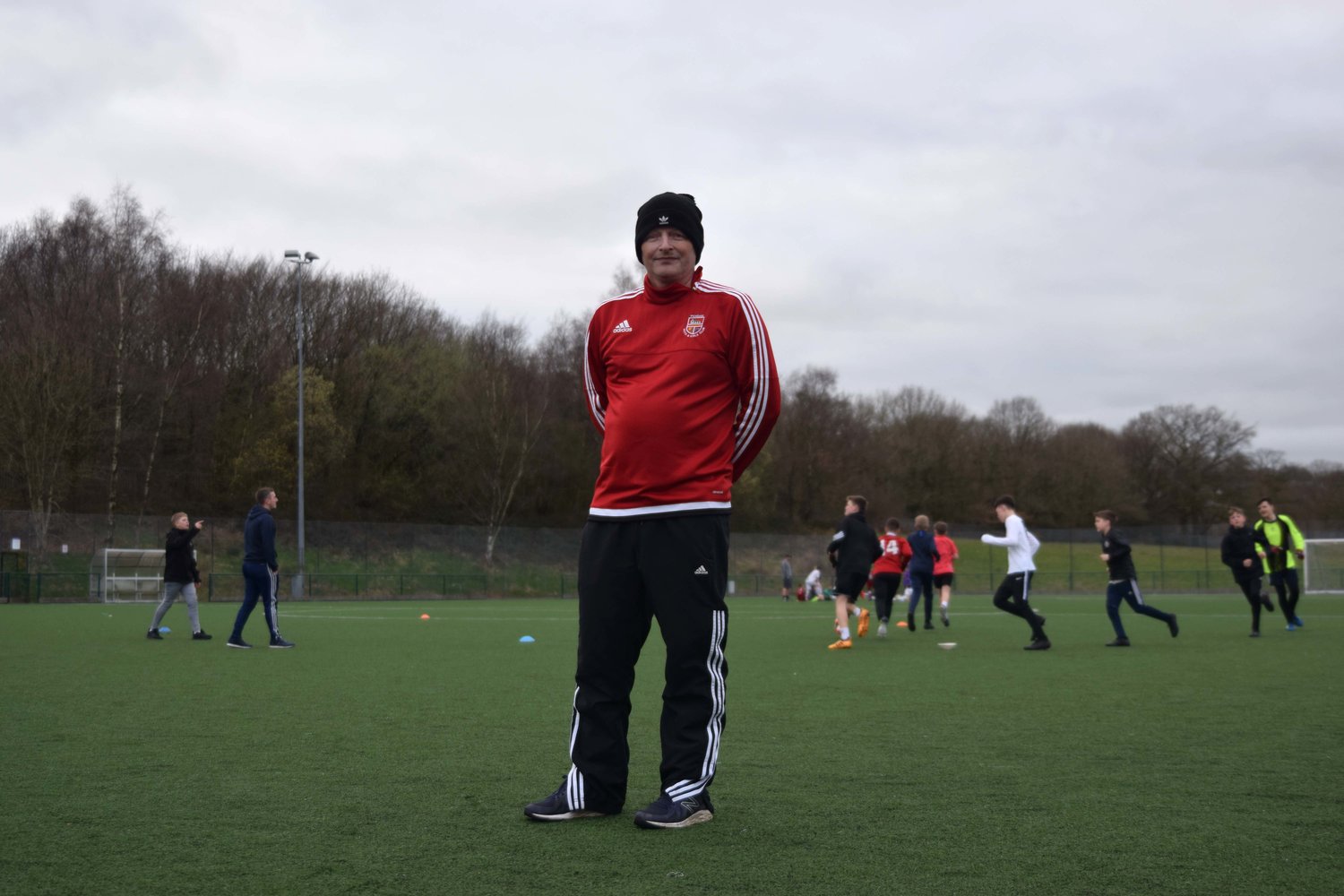
“The Council Doesn’t Represent the Labour Party. We Do”
How a leisure centre in south wales became a battleground for local democracy.
A major campaign to save two leisure centres in the Sirhowy Valley has seen thousands of local people come together to defend their community against devastating cuts. But the battle has also become a flashpoint in the fight to stop Labour run councils implementing Tory austerity; a practice which many feel is damaging the party in its heartlands and the communities it is supposed to serve. Now, activists say the issue is so serious it could decide the outcome of the next general election.
Words by SC Cook. Images by V Merkov
We meet Dean Jones on a sunny spring evening in Pontllanfriath near Blackwood, South Wales. He is gathering footballs, cones and general training supplies from the boot of his car when he greets us.
Dressed in a red and black tracksuit and adidas beanie, he gets himself ready to coach the under 11’s Pengam boys and girls football team.
“I’ve been doing this for 10 years” he says, looking across to the artificial football pitch in front of us. “A lot of these children started out together when we was doing under 4s, under 5s. I got a picture on my Facebook of their very first game here.”
When his son Luke started playing at four years old, Dean got a team together and has been coaching ever since. He gestures to the football pitches in front of us that are already filling up with kids kicking footballs.
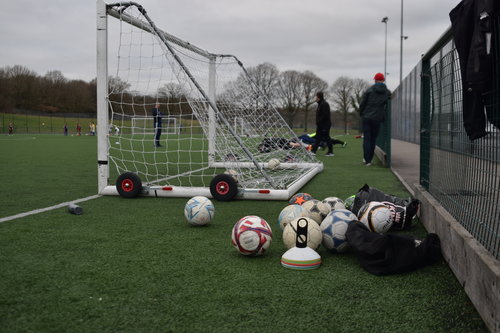
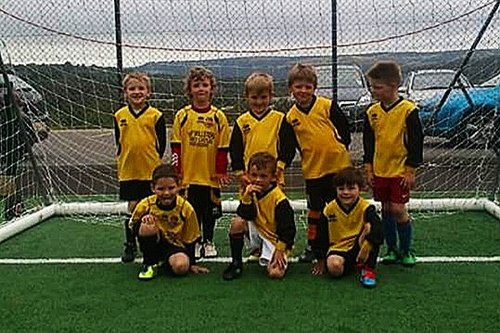
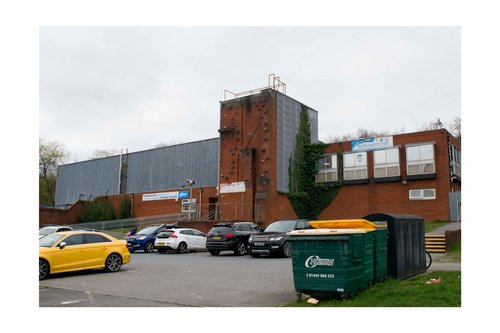
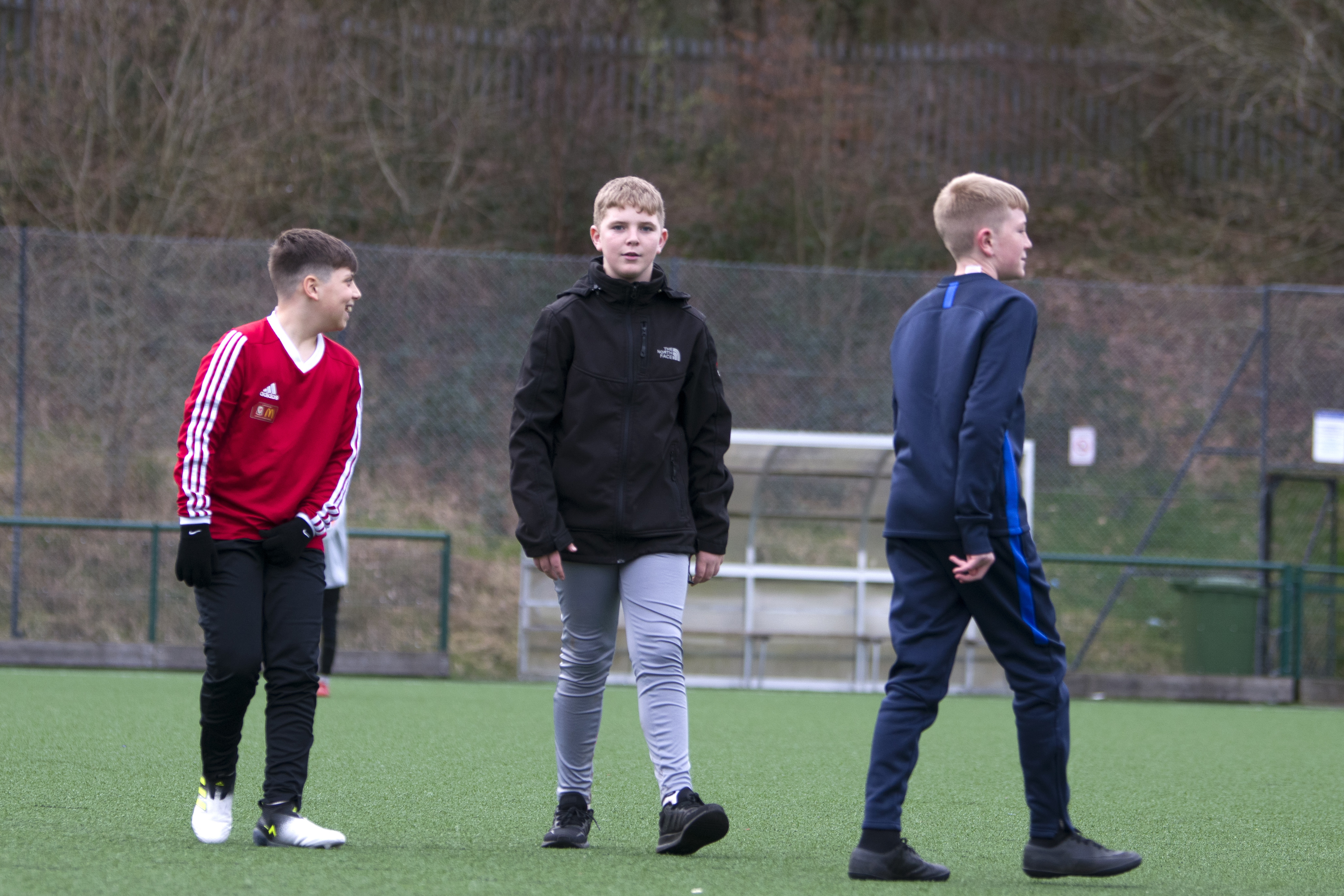
21 March 2019, Pontllanfraith, Wales, Kids training at the Leisure Centre. Caerphilly County Borough Council is carrying out a public consultation about plans to close Pontllanfraith Leisure Centre. Pontllanfraith Comprehensive School, which shared the same site as the Leisure Centre, closed earlier this year and a demolition programme is being developed to prepare the old school site for future use. It is important that users of Pontllanfraith Leisure Centre get the chance to have their say about the proposals before the council makes any final decision.
Dean’s tone changes to a sombre one. “You know, they’ve all grown up together. Always help each other out and support each other. We’ve had some good times here.” Deep down, he knows there is a strong chance that this could be the last season the team can train here.
In the Autumn of 2017, the Labour run Caerphilly council announced plans to shut down this entire site which includes the large leisure centre in Pontllanfraith and its neighbouring artificial football pitches. Further up the Sirhowy Valley in Cefn Fforest, another leisure centre with a large swimming pool was also put under threat of closure.
The plans were put on hold following the threat of legal action and public outcry, but the sites were again earmarked for closure as part of a wider leisure strategy in 2018.
While plans to shut Cefn Fforest are on hold for the time being, the future of Pontllanfraith Leisure Centre where Dean trains his football team is much less certain. As things stand, and if the local community do not succeed in last ditch efforts to avert it, this entire site will close at the end of June 2019.
“So just in time for the school holidays, when some of these children could possibly grab a ball and come down here and spend their summer holidays on this site [it’ll be gone]. It’s not just about the team; it’s about the overall social impact of the leisure centre. Otherwise they’re just wandering around the streets.”

The fate of around forty clubs, taken up by thousands of local people, hangs in the balance. “Some will end,” says Dean. “There’s [even] a walking football club. There aren’t the facilities to transfer every single club and every paying customer who uses this centre elsewhere. There simply isn’t.”
“It will just affect everyone. And in that respect I’m not here to defend my own age group because we will find a way of surviving, but its solidarity with all the other sports and people using the facility.”
Dean says he will do whatever it takes to keep the football team running but he cannot guarantee he will be able to bring every player with him if they have to move site. The majority of them come on their bikes and Dean fears many will just drop out if a new training pitch is too far away.
“It’d be devastating [if we lost the football team],” he admits. “Absolutely devastating. I wouldn’t like to comment on what would happen to [the kids] because you know, a lot of them have got difficult enough lives as it is never mind losing the only thing that keeps them on the straight and narrow like. So I wouldn’t like to say.”
Many of the players, he tells me, have been expelled or suspended from the local comprehensive school. “They [still] turn up for games and training,” he says. “It’s actually their life. You know, people don’t realise it.”
It is examples like this that show how vital the leisure centre is to the community. And it has provoked huge opposition from the moment plans to close it were announced.
In the preceding months and years, the campaign to save this site has drawn in huge support from the local community, the local MP and even former Labour leader Neil Kinnock.
A high point came at the end of last year, when hundreds of people marched through Blackwood in protest. The demonstration was attended by all the various groups who use the leisure centre, with young and old people dressed in their team kits in what was a celebration of the leisure centre just as much as it was a protest against its potential closure. This, say those involved in the campaign, proves how strongly the community feels about the facility.

But the campaign has also become a symbol for something else: the crisis within Welsh Labour and how the party deals with huge spending cuts imposed by the Conservative government in Westminster.
This is about something far more tangible than Brexit. It is about the steady erosion of public services under the leadership of Labour local authorities and the way in which this stands in stark contrast to the anti-austerity message of the Corbyn leadership.
The campaign to save Pontllanfraith and Cefn Fforest is in many ways a microcosm of this crisis.
Dean, himself a Labour member of several years, describes the problem partly as one about democracy – or lack of it.
“The councillors are not representing the wishes of the local Labour party,” he tells me. “The Islwyn CLP [Constituency Labour Party] overwhelmingly voted – I think one person voted against – to keep this facility open.”
In spite of this, Dean says the councillors pushed ahead with closure.
He describes himself as a Corbyn supporter. “Of course I am. It’s for the many and not the few,” he says, repeating the party’s slogan from the last election. “This is why in our fight here we won’t leave any club behind. We won’t leave any individual who uses this centre behind. We’ll fight for every sports club no matter what size they are. Even if it’s three members in the club, we’ll fight for them. That’s what it’s about isn’t it, the Labour movement: solidarity and fighting for the working class.”

One of the challenges that has faced the left in Welsh Labour – and arguably England too – has been how to use the leadership of Corbyn to shift the party at a local level to a more radical footing. Many Labour councils are still run by people who actively opposed the party’s left turn and, Corbyn supporters say, are at odds with the majority of the membership. A key battleground in this respect has become how councils respond to austerity. Do they publicly resist and face the wrath of the Tory government? Or do they implement enormous spending cuts and close centres like Pontllanfraith?
In the autumn of 2018, a motion was voted through the local constituency party that called on the Labour council in Caerphilly to refuse to carry on implementing spending cuts imposed by Westminster. After almost a decade of austerity which has been a catastrophe in many parts of Wales, it was the first motion of its kind in the country and in many ways was a direct response to the decision to close the leisure centres.
The motion stated that “In order to protect our constituents, we must be seen to publicly fight the national government’s austerity agenda.” And demanded that “Labour councillors to immediately oppose the closure of any leisure services.”
In a pub near Ystrad Mynach, I meet a group of four Labour party members – including Dean – who had helped draft and submit the motion. They tell me how it was a real battle just to get it discussed at the local party meeting .
“We first came up with the idea two years ago and we put a motion together and it is was passed in the ward [meeting],” says Cath Jones, a local party activist in her early fifties.
“It went to the CLP… but the secretary and the chair at the time refused [to discuss it]. They said it doesn’t meet the appropriate criteria.’”
![Cath Jones: “[People] just see the Labour party are implementing austerity and see us as the establishment. And we’re trying as the left in the CLP to say there's another way of doing things.”](https://images.squarespace-cdn.com/content/v1/5c99699f92441bd4fc87782b/1559913279086-IIH6MF5PUZ2HVRZH7K13/ke17ZwdGBToddI8pDm48kNu93_l1Rc0JoXikXAEKHf17gQa3H78H3Y0txjaiv_0fDoOvxcdMmMKkDsyUqMSsMWxHk725yiiHCCLfrh8O1z5QHyNOqBUUEtDDsRWrJLTmDJyaVitQ06bkWUY0OMxkmN-bdz7wg8la12Me-ub45vBE5029s6uMXtkNCzVgxK8m/DSC_0170.jpg?format=1500w)
In the following months however, the balance of power in the local party shifted in the left’s favour and the motion was eventually put before the CLP and accepted more than a year later.
It then went to the council cabinet but they said they could not act on it because they had to be ‘fiscally responsible’ and were not accountable to the local party.
But the fact that it took over a year to get the overwhelming wishes of the membership registered, and then for them not to be recognised, has not been missed by party members.
Cath’s partner, Dave, explains the impact that this attitude to democracy is having on the party locally.
“There’s no young people [at meetings] because they’re not enthused by it,” he says. “This is an old guard Labour party that just doesn’t change. So it needed a bit of shaking up and it needs people younger than us to shake it up even more.”
“A lot of people in my time would come [to meetings] just once,” says Mat, a member in his thirties who has been active in the party for four years. “You might see the Corbyn effect in terms of membership [but] people would wonder why we couldn’t get anyone there. You’d see people come once and never come again.”
“In the CLP there was never any discussion about politics,” Cath remarks. “I was really surprised to think I was going to a political meeting because it was purely about procedure…I think that’s kind of changed [since the motion was passed].”

As we settle into our drinks, it is not hard to see why there is real frustration about the way the impact of cuts has been ignored by the council. If local football pitches are paved over, Cath says many children will not able to access facilities further away:
“We haven’t got lots of parents [in the Rhymney valley] who have got two cars and 9-5 jobs and can ferry their kids around. We don’t live in that sort of community. We’ve got families who work shifts, who really on public transport, all those sorts of things. It’s not a case of: ‘oh well we’ll get in a car and go wherever we need to go.’ It doesn’t work like that.”
Dave adds that “the higher up the valley you go (apart from two wards) the more impoverished it gets and the further away from any facilities. If these go, you’re talking one or two busses to get to a leisure centre and people aren’t gonna do it”
“People say Labour closed the leisure centres,” he says. “Well yeah, they did. You can’t deny it. What it’s become in this area, is the establishment; doing the Tories work for them.”
Cath agrees: “They just see the Labour party are implementing austerity and see us as the establishment. And we’re trying as the left in the CLP to say there’s another way of doing things.”
It is a hard task, she admits, because there is a real “disconnect between Corbyn on the one hand and the council making cuts on the other.”
“Take the manifesto for the last election,” Mat says. “We round the table can talk about how exciting it is and how it’s what we always thought the Labour party should be. That is an abstract concept to the average person round here. If they see the leisure centre closing…that is what affects them day to day. The football team folds which is what their kid lives for on a Saturday. That’s where you see the effect.”
The warning signs, Cath tells me, are clear: “I keep saying at local meetings that we got a real chance of electing a Labour government unless we mess it up,” she adds. “And one of the ways we’re gonna mess it up is by enacting austerity at a local level because that’s what people care about!”
In this sense, the campaign has become a proxy battle over the soul of the Labour party itself.
“I personally don’t feel that this council represents the Labour party,” Dean says. “I feel we represent the Labour party at the moment. We’re fighting for the working class, we don’t want these cuts, we don’t want people to be made redundant.”
As we speak, it is clear that this fight is far from over and that Dean and his fellow campaigners are determined to see it through.

We catch up again a few weeks later outside the offices of Caerphilly county borough council. The full cabinet of the council have just met and unanimously voted to close the leisure centre at the end of June.
Dean and fellow campaigner Shane Williams, who attended the meeting as members of the public and had hoped to speak, are furious.
A couple of weeks prior, the scrutiny committee threw a lifeline to campaigners by ruling that the closure should not go ahead. Dean was adamant that the cabinet had to listen to their advice. “If they go against [the committee’s] recommendations what kind of democracy is that!!!,” he wrote to me in text the day before the meeting.
Dean had planned to speak but was forced to leave with Shane before he got a chance. Despite its significance to the community, Pontllanfraith was one of the last items on the agenda. When the vote on closure was finally due to take place, the councillor for the ward which houses the leisure centre quickly declared a ‘conflict of interest’ on the basis that he had once used the centre as a customer, and excused himself from the meeting (so he didn’t have to vote).
As the councillor left the room, there was a disagreement about the validity of this excuse and this led to both Shane and Dean leaving the meeting before the decision was even announced.
Shortly after, another member of the public involved in the campaign, who did manage to speak, was shouted down by councillors when she said that children who are being bullied at school would not feel able to use alternative football pitches on school premises. She was told bluntly that it was irrelevant and should be taken up with the education committee instead.
Speaking outside, Shane was clearly shaken by the whole experience. “They say that we don’t have the money to maintain Pontllanfraith, so we have to close it,” he says before pointing out that the council chose to end a major source of income when they stopped the national exercise referral scheme in place at Pontllanfraith. “They stopped it and it cost them 3000 users. And they did it in June 2017 before the consultation. Before they wanted to close it,” he says in exasperation.
This only contributes to an overwhelming feeling among people in the community that the leisure centre has been deliberately run down for years in order to justify closure.
Shane, who himself uses the centre every week as part of a table tennis club, is clear about the effect this whole issue will have on the Labour party locally of which he is also a member.
“I can tell you now,” he says. “I’ve talked to so many people who are not members of the Labour party but have voted for the Labour party [and they] have said I will never vote Labour ever again, certainly not in a council election and that’s not just on this issue.”
Back at the leisure centre as Dean is taking the coaching session, a grandparent watching on tells me how wrong the council is to close the football pitches. Like most people I speak to, he says it is all about selling on the land to build housing.
I get a chance to speak one of the players, Leo Thomas, the team captain. He says he likes “to help the boys out on matches,” and “speak to them… tell them where to pass.”
Leo is fully aware of the potential closure and the impact it could have. “If it closes that would mean that we would make less friends. We need to keep more kids out of trouble,” he says.
“That’s why we all went for the march in Blackwood. We need to open more [pitches], not building more houses.”
![Leo Thomas, Team Captain: We need to open more [pitches], not building more houses.”](https://images.squarespace-cdn.com/content/v1/5c99699f92441bd4fc87782b/1559914178909-KGJQAO8FC3LGBUVBQATG/ke17ZwdGBToddI8pDm48kG87Sfbgg29A4BYEDq3OXvgUqsxRUqqbr1mOJYKfIPR7LoDQ9mXPOjoJoqy81S2I8N_N4V1vUb5AoIIIbLZhVYxCRW4BPu10St3TBAUQYVKcf4OxbJOyh_wHUnyc4kQLQ6SBshRGOku7c30Y_IRDNPta8R2IY5BHMaEj1zOWoDTZ/VM_LeisureCentre_Final2+%281%29.jpg?format=1500w)
The campaign is not over yet however, and Dean and others have lodged a claim against the process the council took with its consultation. Despite clear objections to their proposals, the council pushed ahead regardless and now face a judicial review on the 19th June. If successful, it would halt the plans for the time being and be a major victory for the campaign.
“That’s the only thing we could do in the end,” Dean tells me when we speak a couple of months later. “It would have been nice to have some dialogue with the council but that’s not the kind of people they are.”
If the leisure centre here does close, the impact will be felt across this whole community and for generations to come. In the campaign Facebook group, somebody from nearby Underwood in Newport posts a short homemade video of their long since mothballed leisure centre – closed by another Labour council and now a wasteland. The video comes with a warning that this is the future that could await Pontllanfraith.
But perhaps the hollowed-out leisure centre should also be a warning to the Labour party itself. This is what it could become if it is seen by communities as a party that closes the things that people love and cherish.
These are the warning signs being waved by Dean and others as they fight for a different path that is far more combative with the Tory government and far more ready to defend local services from cuts.
Had Corbyn not won the leadership, it would undoubtedly be harder to stay and fight. As it is, many now see a bigger picture of a radical Corbyn government that will end austerity and fundamentally change the economy so it works for the majority.
“We’re talking about getting the Tories out of government and getting a better government in who cares about people really,” Dean says. “We may lose a battle here but in the end there’s a war going on.”
He dismisses the idea that he will leave the party if the council here gets its way. “No, I’ll stay and fight,” he says with a smile. “I like fighting.” Dean’s determination may be a feeling that resonates among thousands of people in the Labour party and one which keeps them going through various internal battles.
It seems clear, however, that for every member weathering storms like the one in Pontllanfraith, there are several would be voters and supporters who cannot stick around. According to many people here, their loyalty is not being shredded by Brexit, but by Labour councils which have, in the majority, administered Tory austerity with little resistance.
The scale of a general election and people’s tendency to separate local and national, combined with Corbyn’s strong anti-austerity message, may be able to overcome these problems. In the meantime, battles like the one in Pontllanfraith continue and the longer they do, the more chance the Tories may have of clinging to power.
If you have enjoyed reading this article, please consider making a small donation by clicking the button below. Thank You.

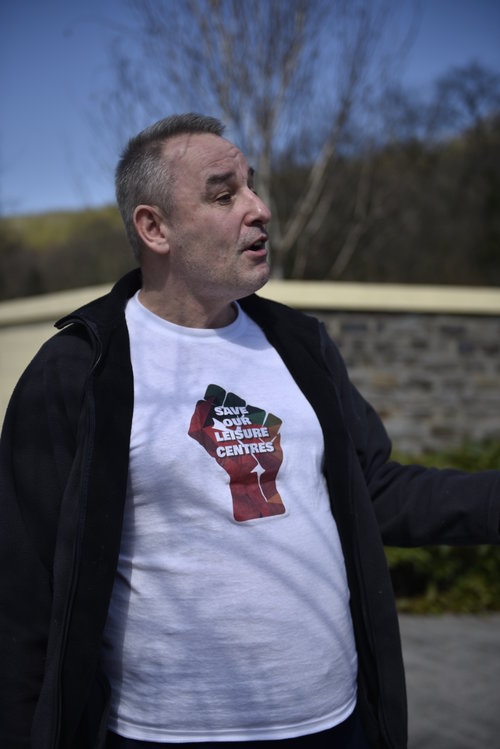
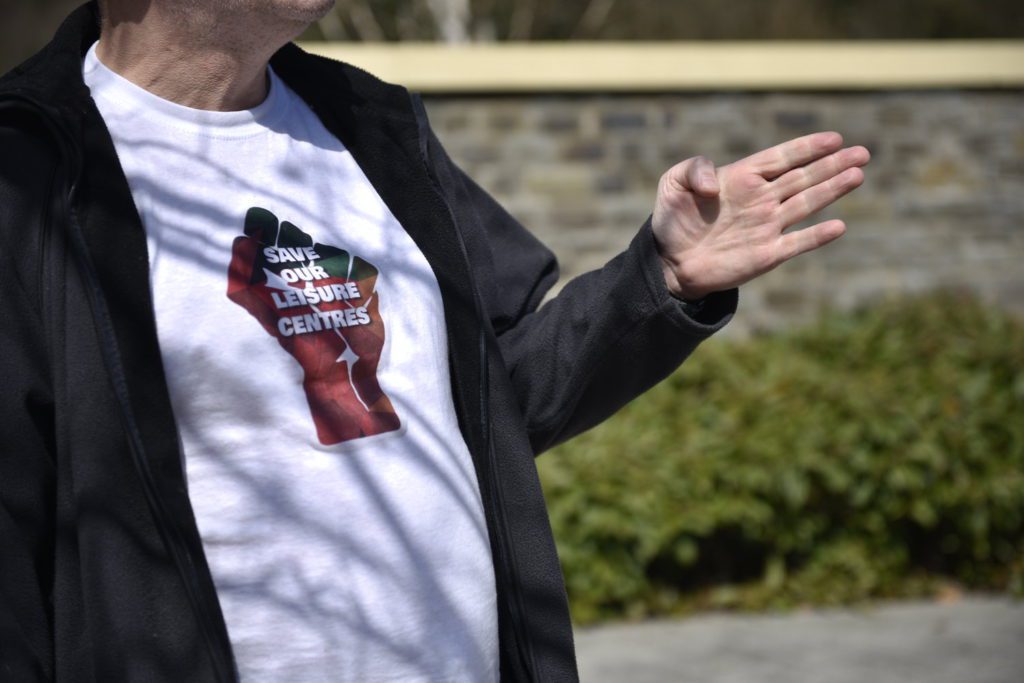


1 Comment
Comments are closed.